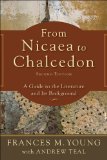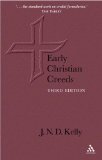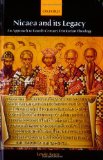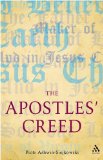|
Relevant
books
available at Amazon
 
Frances Young
-----
 
J.N.D. Kelly
-----
 
Lewis Ayres -----
 
Piotr Ashwin-Siejkowski
Early Christian Doctrine and the Creeds
-----
 
Piotr Ashwin-Siejkowski
-----
Liuwe H. Westra
Apostles' Creed: Origin History and Some Early Commentaries (Instrumenta Patristica Et Mediaevalia, 43)
|
22. This was the beginning of their Councils, and in
it they were speedy in divulging their views, and could not conceal them. For
when they said that they had banished all jealousy, and, after the expulsion of
Athanasius, Bishop of Alexandria, recommended the reception of Arius and his
friends, they shewed that their measures against Athanasius himself then, and
before against all the other Bishops who withstood them, had for their object
their receiving Arius and his fellows, and introducing the heresy into the
Church. But although they had approved in this Council all Arius’s malignity,
and had ordered to receive his party into communion, as they had set the
example, yet feeling that even now they were short of their wishes, they
assembled a Council at Antioch under colour of the so-called Dedication and,
since they were in general and lasting odium for their heresy, they publish
different letters, some of this sort, and some of that and what they wrote in
one letter was as follows:—
We have not been followers of Arius,—how could Bishops, such as we, follow a
Presbyter?—nor did we receive any other faith beside that which has been handed
down from the beginning. But, after taking on ourselves to examine and to verify
his faith, we admitted him rather than followed him; as you will understand from
our present avowals. For we have been taught from the first, to believe in one
God, the God of the Universe, the Framer and Preserver of all things both
intellectual and sensible. And in One Son of God, Only-begotten, who existed
before all ages, and was with the Father who had begotten Him, by whom all
things were made, both visible and invisible, who in the last days according to
the good pleasure of the Father came down; and has taken flesh of the Virgin,
and jointly fulfilled all His Father’s will, and suffered and risen again, and
ascended into heaven, and sitteth on the right hand of the Father, and cometh
again to judge quick and dead, and remaineth King and God unto all ages. And we
believe also in the Holy Ghost; and if it be necessary to add, we believe
concerning the resurrection of the flesh, and the life everlasting.
23. Here follows what they published next at the same Dedication in another
Epistle, being dissatisfied with the first, and devising something newer and
fuller:
We believe, conformably to the evangelical and apostolical tradition, in One
God, the Father Almighty, the Framer, and Maker, and Provider of the Universe,
from whom are all things. And in One Lord Jesus Christ, His Son, Only-begotten
God, by whom are all things, who was begotten before all ages from the Father,
God from God, whole from whole, sole from sole, perfect from perfect, King from
King, Lord from Lord, Living Word, Living Wisdom, true Light, Way, Truth,
Resurrection, Shepherd, Door, both unalterable and unchangeable; exact Image of
the Godhead, Essence, Will, Power and Glory of the Father; the first born of
every creature, who was in the beginning with God, God the Word, as it is
written in the Gospel, ‘and the Word was God’; by whom all things were made, and
in whom all things consist; who in the last days descended from above, and was
born of a Virgin according to the Scriptures, and was made Man, Mediator between
God and man, and Apostle of our faith, and Prince of life, as He says, ‘I came
down from heaven, not to do Mine own will, but the will of Him that sent Me’;
who suffered for us and rose again on the third day, and ascended into heaven,
and sat down on the right hand of the Father, and is coming again with glory and
power, to judge quick and dead. And in the Holy Ghost, who is given to those who
believe for comfort, and sanctification, and initiation, as also our Lord Jesus
Christ enjoined His disciples, saying, ‘Go ye, teach all nations, baptizing them
in the Name of the Father, and the Son, and the Holy Ghost’; namely of a Father
who is truly Father, and a Son who is truly Son, and of the Holy Ghost who is
truly Holy Ghost, the names not being given without meaning or effect, but
denoting accurately the peculiar subsistence, rank, and glory of each that is
named, so that they are three in subsistence, and in agreement one. Holding then
this faith, and holding it in the presence of God and Christ, from beginning to
end, we anathematize every heretical heterodoxy. And if any teaches, beside the
sound and right faith of the Scriptures, that time, or season, or age, either is
or has been before the generation of the Son, be he anathema. Or if any one
says, that the Son is a creature as one of the creatures, or an offspring as one
of the offsprings, or a work as one of the works, and not the aforesaid articles
one after another, as the divine Scriptures have delivered, or if he teaches or
preaches beside what we received, be he anathema. For all that has been
delivered in the divine Scriptures, whether by Prophets or Apostles, do we truly
and reverentially both believe and follow.
24. And one Theophronius, Bishop of Tyana, put forth before them all the
following statement of his personal faith. And they subscribed it, accepting the
faith of this man:—
God knows, whom I call as a witness upon my soul, that so I believe:—in God the
Father Almighty, the Creator and Maker of the Universe, from whom are all
things. And in His Only-begotten Son, Word, Power, and Wisdom, our Lord Jesus
Christ, through whom are all things; who has been begotten from the Father
before the ages, perfect God from perfect God, and was with God in subsistence,
and in the last days descended, and was born of the Virgin according to the
Scriptures, and was made man, and suffered, and rose again from the dead, and
ascended into the heavens, and sat down on the right hand of His Father, and
cometh again with glory and power to judge quick and dead, and remaineth for
ever: And in the Holy Ghost, the Paraclete, the Spirit of truth, which also God
promised by His Prophet to pour out upon His servants, and the Lord promised to
send to His disciples: which also He sent, as the Acts of the Apostles witness.
But if any one teaches, or holds in his mind, aught beside this faith, be he
anathema; or with Marcellus of Ancyra, or Sabellius, or Paul of Samosata, be he
anathema, both himself and those who communicate with him.
25. Ninety Bishops met at the Dedication under the Consulate of Marcellinus and
Probinus, in the 14th of the Indiction, Constantius the most irreligious being
present. Having thus conducted matters at Antioch at the Dedication, thinking
that their composition was deficient still, and fluctuating moreover in their
own opinions, again they draw up afresh another formulary, after a few months,
professedly concerning the faith, and despatch Narcissus, Maris, Theodorus, and
Mark into Gaul. And they, as being sent from the Council, deliver the following
document to Constans Augustus of blessed memory, and to all who were there:
We believe in One God, the Father Almighty, Creator and Maker of all things;
from whom all fatherhood in heaven and on earth is named. And in His
Only-begotten Son, our Lord Jesus Christ, who before all ages was begotten from
the Father, God from God, Light from Light, by whom all things were made in the
heavens and on the earth, visible and invisible, being Word, and Wisdom, and
Power, and Life, and True Light; who in the last days was made man for us, and
was born of the Holy Virgin; who was crucified, and dead, and buried, and rose
again from the dead the third day, and was taken up into heaven, and sat down on
the right hand of the Father; and is coming at the consummation of the age, to
judge quick and dead, and to render to every one according to his works; whose
Kingdom endures indissolubly into the infinite ages; for He shall be seated on
the right hand of the Father, not only in this age but in that which is to come.
And in the Holy Ghost, that is, the Paraclete; which, having promised to the
Apostles, He sent forth after His ascension into heaven, to teach them and to
remind of all things; through whom also shall be sanctified the souls of those
who sincerely believe in Him. But those who say, that the Son was from nothing,
or from other subsistence and not from God, and, there was time when He was not,
the Catholic Church regards as aliens.
|

